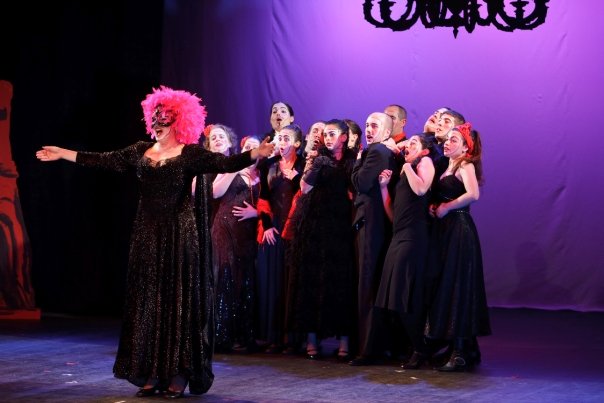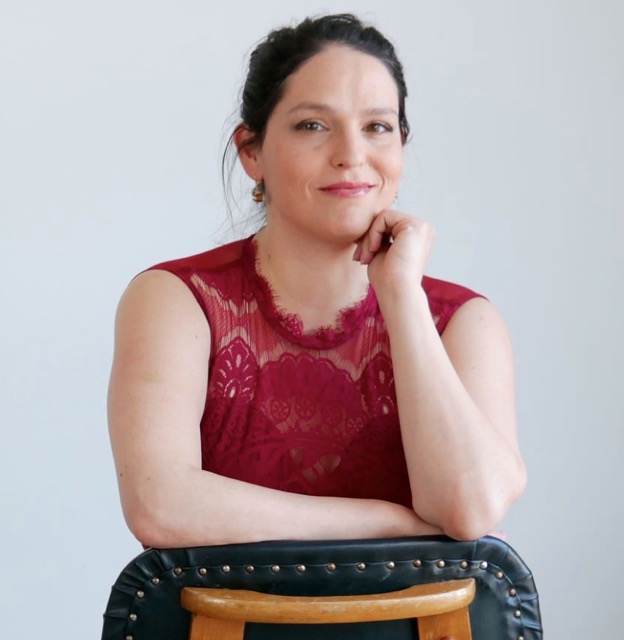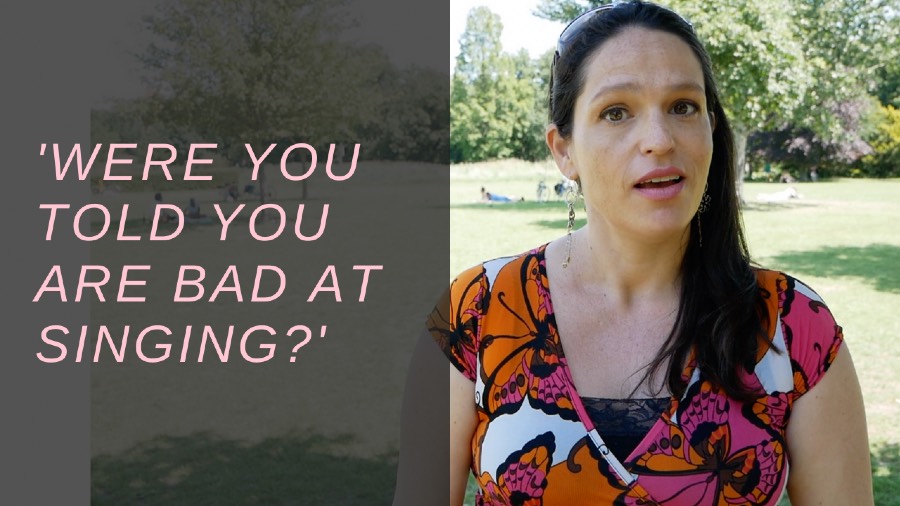After reading this article you’ll know what your intention should be when singing on stage, and how to deal with negative thoughts popping up.
A good first question to ask yourself would be: if I were in the audience, what would I like to see on stage? Or: in general, what do people like to experience when they go see someone perform?
Singing students and beginning artists often overlook this question. They jump to the wrong conclusion that people expect perfection, virtuosity.
If this is your mindset, if this idea gets into your head, it can lead to trouble. Because you will be thrown off whenever you make a slight mistake on stage. It will distract you from the mood, the message, the expression you want to convey.
Consider that it's not the case that pro’s don’t make mistakes, nor do most have perfect technique. That’s not what it takes to become a pro necessarily or to impress people.
Tip 1. Don’t force people to feel - feel it yourself
Another misconception, a bit more hidden maybe, is that professional singers do their best to impress the audience. If you believe this, it can lead to 'trying too hard’: too big gestures, overacting, going towards the audience with your body.
But good performers make it look easy. They don’t force themselves on us - they lure us in. In general, they achieve this with a calm posture, and in such a way that everyone sees that they are enjoying themselves. Even if they deliver a song of heartbreak, they are enjoying that feeling almost. Living it. They are not preoccupied with the thought if the audience is having a good time.
But they know that the way to do this is by first feeling themselves what they want to make the audience feel. Humans are empathetic creatures. We feel what we think someone else feels. So when the audience sees you overjoyed or in pain, they will naturally mirror that feeling.
Tip 2. Express yourself on stage, then don’t hold back
Top actors work with emotional memory: when they ‘act’ they are not acting out. It looks real because in a way it is. I think the same thing goes for singers. You should not attempt to manufacture a feeling, but to have the feeling. It’s easier than you think. In the right moment, everyone is an actor. What I mean is, if you put anyone through a certain situation, they will have the right expression in that moment. If you shock them, they will look shocked. If you give them a good time - they will beam. If you hurt them - they will look like they are in pain. Everyone is capable of being expressive.
If feeling it yourself is your starting point, the next step is to take it all the way, to not hold back, to not be half-hearted. If that brings you to being more physically active, it will feel true, and not like over-delivering. It will be convincing. (In my free online course Learn from the best I have a lesson called The Attitude, in which I react to Celine Dion. She is very extreme in the degree to which she expresses her emotions, but it feels real. That’s what it means to give an audience the experience of a lifetime.
"
"I landed two parts in musical productions in Amsterdam!"
"Linor's course SingWell on Stage was a vital part of my teaching plan. It is one of the greatest investments I’ve made. I still get nervous, especially during auditions. But: I can function. And, even though I’m no fan of auditions, I landed two parts in musical productions in Amsterdam!"
Dunya (36, not her real name). Amateur musical singer and front-end developer
Tip 3. Listen to the mantra monkey
Many people have disrupting thoughts as they sing on stage. This also happens while we sing in general. We think we did something wrong. That might be a right assessment or not, but in any case we can’t help thinking these thoughts.
When a thought like ‘that was wrong’ enters your mind, you arrive at a crossroads. The first road would be to let yourself be dragged down by what I call "the nasty monkey" saying bad things in your head. If you keep paying too much attention to that monkey it just goes on and on, and the audience will see it on your face. They will think: poor guy or girl, they are not doing so well, are they... That’s obviously not the way to go.
So what’s the other road? We can’t magically make the nasty monkey silent. What I have discovered works is to allow a second monkey in my other ear, who tells helpful things at the same time, like a sort of mantras. These things can’t be complicated: there’s no space for that while you’re performing. I have this mantra monkey say things like:
The trick the monkey is talking about can be anything, really. It could be relaxing your shoulders, it could be using your speaking voice, it could be whatever you were working on at home which was quick to help your voice.
This Mantra monkey often combines a psychological encouragement with a simple piece of technical advice that in many cases does the trick.
It doesn’t matter if what this mantra monkey says, doesn’t work immediately, or all the time. Keep listening and the improvement will come.
Reacting to my own performance
'That's not going well, is it?'
... was one of the thoughts going through my head as I sang my first verse during this performance in Berlin in 2019. Here is me confessing about my two monkeys. I also tell in detail what went through my head and whether I was right about it:
Watching footage of yourself is a great learning tool but it's not easy. I got used to it but it's still not easy at the times when I know I could have performed better.
Tip 4. What's inside your head isn't reality
First, you have to have to understand in advance that how the voice sounds in your head is not reality. So any judgment you make while singing, might not be a correct judgment.
By the way, this also holds true for the inner turmoil, the nerves you feel. People will only sense a fraction of that. When I gave a stage fright workshop, we did an exercise where the participants told us afterwards how nervous they had felt, on a scale from one to ten. This was always a higher number than the audience guessed.
So this, again, shows us that we should not pay too much attention to the negative things going on inside us. We can’t ban them, but we have to realize they’re just not to be counted on.
If you are aware of the above, there is a good chance that you can give a good show. In general, the odds are in your favor. You have the potential, and audiences in general are favorable and inclined to view what you give them in a positive light. They will like it better than you think.
I teach singing online
Let me find your bright spot.
Tip 5. The flow can’t be interrupted
Also, the flow of the performance goes hand-in-hand with your airflow. Just to be clear: good singing depends on good airflow. Too many disruptive thoughts will translate into muscle tension and less airflow. You raise your chances of a good performance if you don’t stop, don't slow down, and if you don’t give in to those certain thoughts. It will smooth things out.
So if you want to have a good chance of a technical issue correcting itself, you have to keep going, as if nothing had happened. If, instead of getting thrown off, you keep going, there is a good chance people will not notice or won’t care, or better still - will think it was on purpose!
Suppose in a show you sing one note that is off-key. If you linger on it, there is a chance that people notice. So you don’t want to make an assessment of that note on the spot. This is true whether that screw-up is big or small. What you assess as a mistake might have been an error of judgment anyway.
In case of a ‘big’ screw-up, you keep doing your thing and just know: it might not have been as bad as it sounded in my head. And in the majority of cases, that’s true. The voice is different in our head, acoustically different, and in general we are overly self-critical.
If you try all these things and it doesn’t work: don’t panic. It happens to the very best who sing on stage, and not just in the beginning of their journey. Even big celebrity singers screw up, big time. You can YouTube that if you don’t believe me.
How I performed on an off-day
It was a performance in music academy. I felt terrible that morning, I just didn't feel I was good, I was tired, I didn't feel comfortable in my own skin. I considered canceling my performance. When the evening approached, I decided to go to the venue just in case, still postponing the decision. Only at the very last minute I decided to go on stage. I didn't even have make-up on and I only took my glasses off at the last second. It turned out to be the best performance I gave in all my music academy years. Probably because at that point, I didn't give a f$%k. (Not every off day will be like that. On some days you will be stuck in our head and it won't go well. But by going on stage, you give yourself a chance. But not caring, you raise your chance of success)
Linor Oren - your voice teacher
Tip 6. Go all the way when singing on stage
All the above doesn’t mean that while singing on stage you should settle for less than all you have to give. At the end of the day, the audience wants to see your very best. As I said, that doesn’t mean they demand technical perfection.
But if they get the vibe that you are stingy with them, that you’re not doing everything you know how to do, then they will be a lot less interested. They want the real you, your experience, your take, and they want to see all of it. This is less about big gestures and more about giving everything in terms of expression, of vision.
The thing to remember is to express the feeling no matter what happens vocally. No matter if you hit wrong notes, sing wrong lyrics.
Having said that, even though it's not about technical perfection, I do believe that better technique serves the expression in your voice. It’s interesting how these two things serve each other. There are a lot of performance/drama exercises which enhance your vocal technique AND vice versa.
The insecure student
I had a super insecure student, who was struggling in the beginning to open her mouth. She was not at all feeling comfortable making singing sounds. It took me four lessons before she was actually able to start a sound without me singing along with her. When we got ahead with that, I realized she sounds kinda decent, but the trouble was she was also preparing for an audition. Even though the sound was ok, I told her: ‘the audition is a goner if you put on a face like someone just killed your cat. I asked her: can you think of an activity or a time in your life when you were ecstatic? She said: when I went to Disneyland. I said: I want you to have a Disneyland face on all the time. Remember that feeling as much as you can. Look in the mirror to trick your brain, to reinforce that feeling. My student did this and it was the first time she sang the whole song through and it was a lot better vocally. That was a lot easier to work with. Everything was enhanced.
Vocal technique helps expressing yourself on stage
The flip side of the above point. I’m a big believer in learning how the voice works and in having access to it. Learning vocal technique will give you more ways to express yourself. What you do when you improve your technique, is opening up resonances. Using these better, get more power volume, range, colours. You’re starting to feel your voice more.
Those things alone allow you to decide on the spot what to express. Before you have the technique, you can have all the intentions, but we won't necessarily hear it in your voice. When you would discover more in my voice, you would feel things more intimately. You realise then that with an open instrument suddenly you can make it softer or louder or more vibrant of more straight toned. You can play around with those things in order to express something.
Deal with stage fright

If you in the majority group of people who suffer from fear of public appearance (for singers that means stage fright), you must be asking yourself whether you will ever get over it. Let me tell you: you will and you won’t.
The fact that I flourish and enjoy myself on stage now, does not mean I don’t have the fright. I still feel the nerves, my heart racing, the panting. But I know these sensations better now, and I know the show will be fine. I know what to focus on, which is the experience I will give my audience.
I go up there all shaky, but in a good way – because I learned it is NOT about NOT having the stage fright. It’s about having it, and singing with it, letting it take you to a surprising place, maybe a better place as a performer.
Now, this is easier said than done. In the earlier years my body wanted to shut down in the surge of adrenaline. My body before the show said: don’t go up there, go home. Even though it was the solo I wanted so much and was so excited when I got it. Even though I am literally living my dream. Why would I want to go home??
I wrote a huge and hugely useful article about dealing with stage fright, check it out.

About the author
Linor Oren
I'm an opera singer and (online) voice teacher, based in Amsterdam. It took me more than a decade to overcome my share of mental and physical issues and reach a professional level as a singer. Because of this background, and my 10+ years of teaching experience, I believe I can speed up your learning curve as a singer.
Take your desire to sing seriously: get tools to become a better singer in your inbox
Eye-openers, motivation and stories. Also valuable tips that I don't publish on my website.




Do you have to be a performer to learn how to sing properly?
I don’t believe so. I think you have to perform in order to learn how to sing properly on stage. Because the body and voice behave differently in the practice room than on stage.